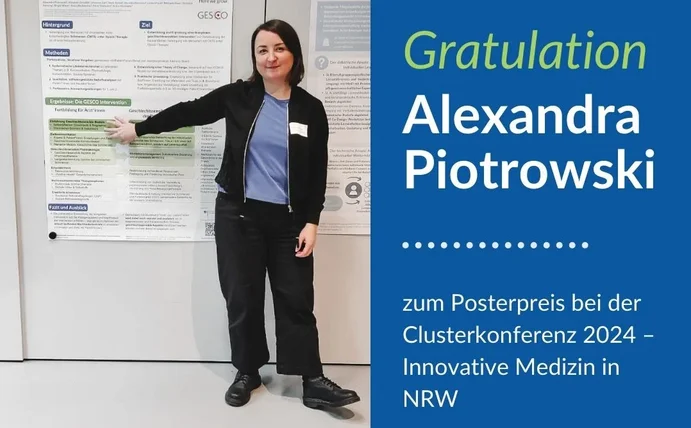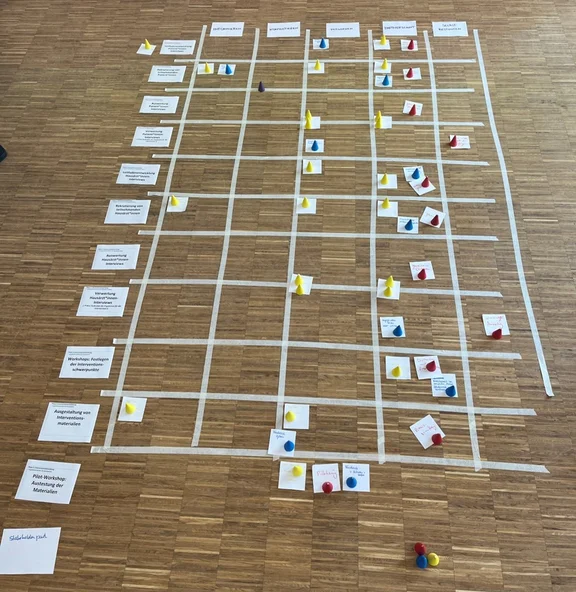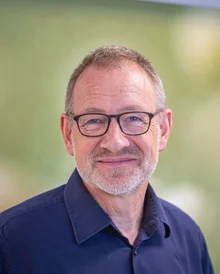
- Health
- University
Poster prize at the Cluster Conference 2024 - Innovative
Alexandra Piotrowski from Witten University won a poster prize at the “Cluster Conference 2024 - Innovative Medicine in NRW”.
Funded by the Federal Ministry of Health (BMG)
The project is researching the development and piloting of a gender-sensitive care concept for patients with chronic non-tumour-related pain undergoing long-term opiate therapy.
GESCO is part of the Gender-specific characteristics in health care, prevention and health promotion programme, a funding priority of the Federal Ministry of Health.
GESCO stands for the development and piloting of a gender-sensitive care concept for patients with chronic non-tumour-related pain under long-term opiate therapy. To achieve this goal, the project consists of four phases:

Among other things, gender aspects have an influence on the perception of pain, how pain is dealt with and how pain is described.
The gender of the GP treating the patient and that of the patient receiving care also plays a role in communication and thus also in medical treatment.
In order to process relevant current research results for the GESCO project and the development of the care concept (intervention), a systematic literature review will be carried out in the first project phase.
Various methods will be used to develop the gender-sensitive care concept within the 2nd project phase:
In the course of testing the treatment concept, 10 GPs from different GP practices will each receive two half-day training sessions. It is planned that the GPs will conduct two intervention interviews with each of the 4 patients they have recruited in the practices at the beginning and after 6-8 weeks.
The GPs and patients will be recruited with a balanced distribution of gender and region of the practice (urban/rural). The treatment concept will be tested in a target group of adult patients (≥18 years) with chronic non-tumour-related pain who have been receiving opioid painkillers for at least three months.
In order to measure the effect of the new treatment concept, the pain-associated impairment in everyday life, which is measured per patient using the Pain Disability Index (PDI) before and after the intervention, is used. After completing the testing of the intervention with the patients, all participating GPs will be asked about its feasibility in a telephone interview. In addition, the GPs will be invited to a joint focus group discussion to analyse their experiences in more detail and identify possible areas for adaptation. The patients will be contacted by telephone and asked to report on their experiences with the treatment concept and possible needs for adaptation.
The aim is to develop a care concept that can be used in practice and meets the needs of patients and GPs.
All results developed in the project should be processed and communicated with the participation of all project partners and all GPs and patients involved. The results should also be usable for other fields of treatment.
As a project team, we orientate ourselves on scientifically published definitions, such as the guidelines of the European Commission or SAGER (1-5).
In English, two different terms are used for sex: sex and gender. In German, these are translated as biological and social sex.
Biological sex (sex) is generally operationalised by biological markers such as primary and secondary sex organs, chromosomes and hormone concentrations (2,3). Biological sex is usually categorised as female, male or intersex. At the same time, a continuum can be assumed in the way in which biological characteristics are expressed (1).
Social gender refers to people's socially constructed gender roles, gender identities and relationships. In reality, there is a spectrum of gender identities with which people identify and express themselves (1). Gender is multidimensional and complex and changes as social norms and values change (4). Social gender also intersects with other socio-cultural categories (e.g. socio-economic position) (3).
Sources:
Studies have shown that biological sex (sex) and social gender (gender) have an influence on health and illness.
This influence is expressed, among other things, in disposition, frequency of illness, coping strategies and course of therapy. The biological and social gender of the patient on the one hand and that of the healthcare professional on the other can influence the care process (1). Taking gender into account is therefore relevant for medical care in order to ensure adequate treatment.
By gender-sensitive intervention, we mean the consideration of biological and social aspects of gender in the therapeutic process.
Sources:
The aim of the project is to develop and test a new health-promoting, gender-sensitive care concept to improve the care of patients with chronic pain on long-term opioid therapy in GP practices without cancer. We want to achieve this goal together with patients, GPs and other researchers from related fields.
Germany is one of the countries in the world with the highest per capita consumption of opioids (very strong painkillers) among patients with chronic, non-tumour-related pain. Analyses of health insurance data show that these patients receive inadequate care, especially if they have other, primarily mental illnesses in addition to pain. The current guideline on the treatment of pain patients with opioids recommends that doctors critically examine the use of opioids in patients and make better use of alternatives.
Possible differences between men and women should also be taken into account when treating pain patients. This includes, for example, how medication is processed in the body, how pain is perceived and how pain is dealt with. In addition to gender, this may also be influenced by other personal circumstances (e.g. cultural background, family circumstances). In order to reduce the misuse of opioids, there is therefore a need to develop treatment concepts that take gender into account and can be adapted to different patients and their individual needs. The development and testing of such a concept is the aim of the GESCO project.
It is planned to include the perspective of patients, GPs and other researchers in each project phase. To this end, strategies for participation will be designed, discussed and their practicability evaluated. Participation is intended to ensure that the new care concept is appropriate and practical.
The participation concept itself will be planned and implemented taking into account the wishes and needs of the patients, GPs, other researchers and researchers involved in the project. A joint workshop on participation planning was held for this purpose.

Workshop on participation planning (Photo: IAMAG)

Researcher
Faculty of Health (School of Medicine) | Institute for General Practice and Outpatient Healthcare (iamag)
Alfred-Herrhausen-Straße 48
58455 Witten
Room number: NB-2.037

Study assistance
Faculty of Health (School of Medicine) | Chair of General Medicine I and Interprofessional Care
Alfred-Herrhausen-Straße 50
58455 Witten
Room number: 2.037

Researcher
Faculty of Health (School of Medicine) | Institute for General Practice and Outpatient Healthcare (iamag)
Alfred-Herrhausen-Straße 50
58455 Witten
Room number: 2.040

Prof. Dr med.
Chair holder
Faculty of Health (School of Medicine) | Chair of General Medicine II and Patient Orientation in Primary Care
Alfred-Herrhausen-Straße 50
58455 Witten
Room number: NB-2.038.2
Orcid ID: 0000-0001-9901-1727